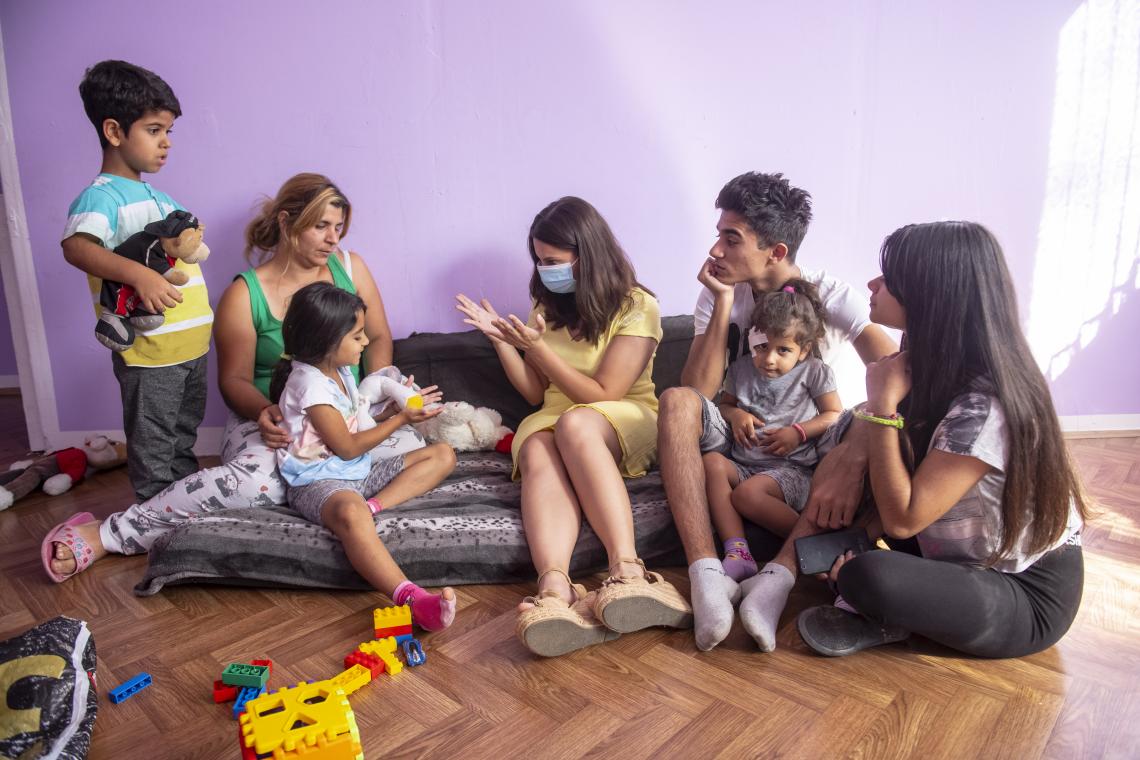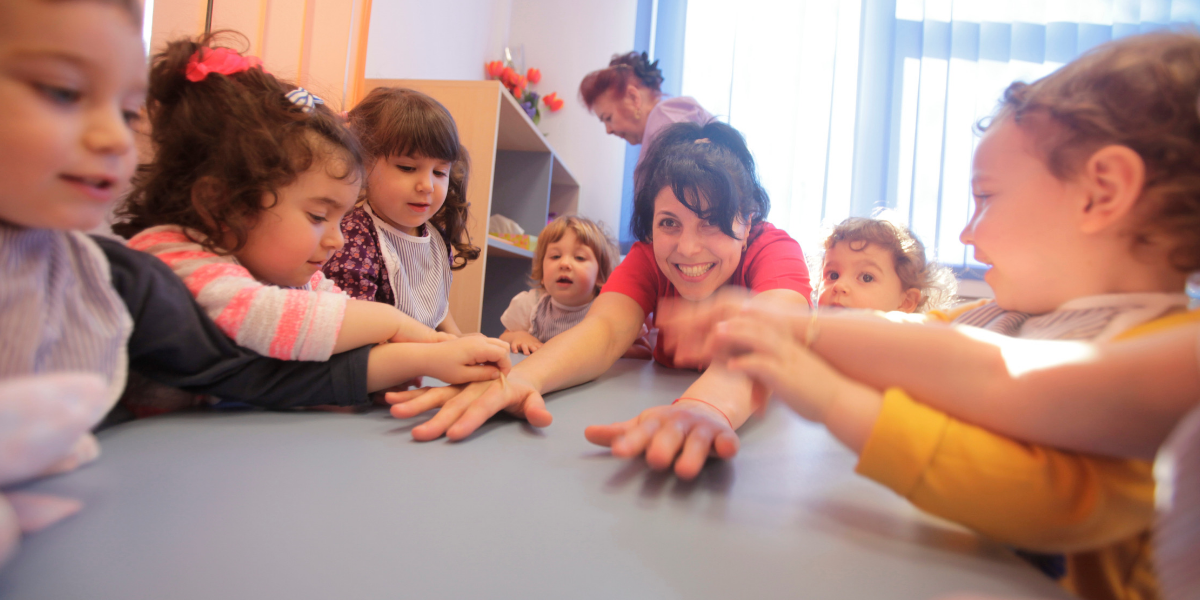|
This blog post is a repost courtesy of UNICEF Serbia. Read the blog in Serbian here. |
|
|
Serbia, Bor, Valjevo, 17 September 2020 – Marina Sinanovic, the only health mediator in Bor, is in an abandoned school, visiting the Demiri family. The mom, Elida, explains to her that she has been taking care of the five children on her own during the past month, because their father, Nesat, finally found a job. Nadjija and Ibarim, already teenagers, help with caring for their younger sisters Elena, 6, and Leonora, 3, and their brother Nebojsa, who is 10.
“Marina always tells us what to eat, to wash our hands, to study,” says Nadjija. Meanwhile, Elena brings her bag and shows us her toys. “I got building blocks and dolls. It’s for me and my sisters,” she says proudly.
|
|||
|
Two and a half years ago, Marina decided to become a health mediator because she herself experienced discrimination and rejection as a child. She wanted to help her community, but also to help Roma children grow up to be more self-confident. Today, she cares for 400 Roma families.
|
|
||
|
“There are a lot of Roma people who are uneducated and illiterate and are afraid to go to the doctor. Mothers take their children to get vaccinated, but they don’t go to the gynaecologist. I'm here to convince them, schedule an appointment, take them there. When the coronavirus pandemic started, the parents were afraid for their children, so I kept calling the doctors at the Primary Health Care Centre to ask what to do if the child coughs or has an allergy, which syrup to take, what to eat,” she describes how she spent days during lockdown.
During the state of emergency, she would answer more than 100 calls, messages and questions on social media daily. She was especially concerned about pregnant women and young mothers.
The fact that health mediators had many years of training about the importance of early childhood care and development, nutrition and learning through play, and were also empowered to help the Roma population in exercising their rights to health and social protection and education, proved to be especially useful during the COVID-19 pandemic.
|
|||
|
|
Marina and her colleagues were ready to devote themselves to children and help the most vulnerable families in difficult and unpredictable circumstances.
|
||
|
Marina says she can't tell just how many online meetings and workshops she organized with parents and children. The children learned new words, numbers, learned to calculate, to draw. Whenever there was distribution of humanitarian aid, including family boxes for learning and play, she would use the opportunity to explain to them how some resources, toys and board games can be used both for learning and bringing together family members, particularly siblings. “I advised parents on how to play with their children, what stories to read to them. They had to fill that time, to forget that they were in lockdown. The children were thrilled, because in this difficult situation, when the family redirected all its money to buying food, the children received toys, to help them connect with their parents,” says Marina.
|
|||
|
And 180 kilometres west of Bor, in the city of Valjevo, Gordana (Goca) Petrovic takes care of 600 Roma families. |
|||
|
“Whatever we needed, from paperwork to food and hygiene packages, we called our Goca. We have four children, and our eldest son Nemanja (16) has cerebral palsy, and she provided us with diapers for him. Can you imagine how much Goca means to us?” This is how Darko Omerovic, who together with his family, receives welfare and lives in a Roma settlement on the outskirts of the city, talks about a family friend, a mother of three children, and a health mediator. When Gordana started working 11 years ago, they were the first family she visited. “That was when I first saw Nemanja, he was 5 at the time. I immediately took him to the dentist and to get vaccinated. I became so attached to this child, but he also became attached to me,” says Gordana. |
|||
|
She has helped them move to a better house, helped Nemanja get help from a neurologist, urologist, and physical therapist, and made sure that Ilija, 15, Aleksandra, 13, and Sara, 3, are vaccinated and that they receive everything they are entitled to through the social, health care and the education systems. |
 © UNICEF Srbija/2020/Pančić |
||
|
The Omerovic family is just one of 600 Roma families Gordana is helping gain access to health care services. The lockdown due to the coronavirus pandemic was a challenge for everyone, and Gordana had to switch from fieldwork to phone and online counseling. “We communicated by phone, via Messenger, Viber, and social networks. I connect with the family and teach them how to wash their hands properly and wear masks, I remind them to keep their distance and eat healthy food. I’m proud of all of them because they were disciplined. Until June, we didn’t have a single Roma person who was infected with the coronavirus, and to date, only four have been registered as positive to COVID-19,” says Gordana.
|
|||
|
|
She provided drinking water cisterns to the settlements without sewerage, and together with the Red Cross, she managed to visit each family at least once and bring them hygiene packages, food and toys. She didn't forget the Omerovic family. Sara, the youngest, was the happiest she received some toys and she proudly keeps telling us all the time, “I am three and a half years old.” |
||
|
She always has her favourite doll with her. The thing she likes doing the most with Gordana is colouring. They also learned to count to 5, they boast. When her older sister is studying or is at school, what she likes the most is playing with building blocks with her dad. “I don’t know a better father than Darko. He takes them to school, to the doctor, he plays with them. He gives all of himself to his children,” says Gordana and adds, “I also played dominoes with the children online for an hour and a half. It was a nice and new experience for them.” However, what many needed the most during the lockdown was psychological support and a kind word. “They were afraid. It was hard for them not being able to work. You know, many families are financially dependent on just one family member. I kept repeating to everyone – this, too, shall pass, the most important thing for you is to stay healthy,” says Gordana and recalls how she was afraid herself.
|
|||
|
Gordana and Marina are just two out of 85 health mediators working with 60 Primary Health Care Centres across Serbia. They enjoy the trust of the community because of their dedicated work, but also because they are Roma women who come from Roma settlements and speak the Roma language. |
|||
|
In 2008, the Ministry of Health of the Republic of Serbia launched a project within which a network of health mediators was established and through which they were educated and empowered to support Roma communities in the health care system, and above all, to support families with young children. The process of institutionalization (integration) of their occupation and profession into the system is still ongoing. The pandemic has shown very clearly how important their role is, and their impact on families, thanks to the trust they have built. UNICEF, as the Ministry of Health’s long standing partner, is supporting the continuity and quality of services provided by health mediators during the COVID-19 pandemic thanks to the financial support of GlaxoSmithKline (GSK). GSK is committed to improving the health of Roma children in the Republic of Serbia and the region through the “Together for Better Health” initiative. |
|||



 © UNICEF Srbija/2020/Pančić
© UNICEF Srbija/2020/Pančić

